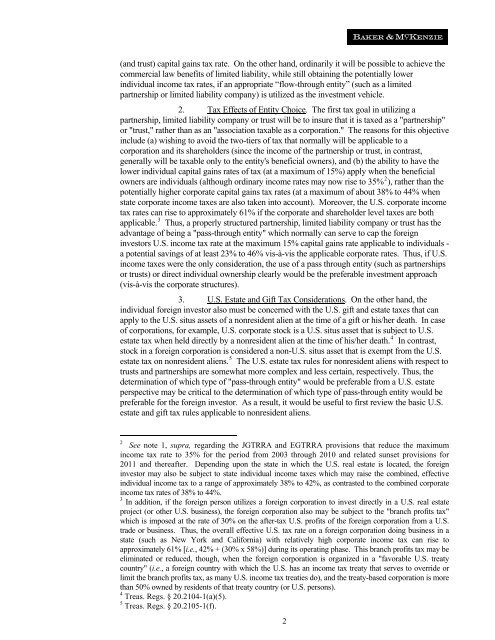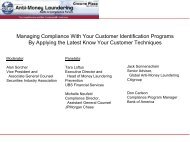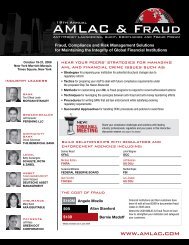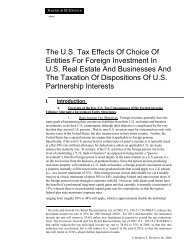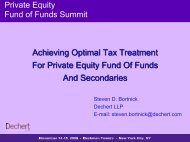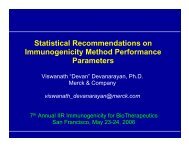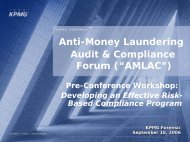The US Tax Effects Of Choice Of Entities For Foreign Investment - IIR
The US Tax Effects Of Choice Of Entities For Foreign Investment - IIR
The US Tax Effects Of Choice Of Entities For Foreign Investment - IIR
You also want an ePaper? Increase the reach of your titles
YUMPU automatically turns print PDFs into web optimized ePapers that Google loves.
(and trust) capital gains tax rate. On the other hand, ordinarily it will be possible to achieve the<br />
commercial law benefits of limited liability, while still obtaining the potentially lower<br />
individual income tax rates, if an appropriate “flow-through entity” (such as a limited<br />
partnership or limited liability company) is utilized as the investment vehicle.<br />
2. <strong>Tax</strong> <strong>Effects</strong> of Entity <strong>Choice</strong>. <strong>The</strong> first tax goal in utilizing a<br />
partnership, limited liability company or trust will be to insure that it is taxed as a "partnership"<br />
or "trust," rather than as an "association taxable as a corporation." <strong>The</strong> reasons for this objective<br />
include (a) wishing to avoid the two-tiers of tax that normally will be applicable to a<br />
corporation and its shareholders (since the income of the partnership or trust, in contrast,<br />
generally will be taxable only to the entity's beneficial owners), and (b) the ability to have the<br />
lower individual capital gains rates of tax (at a maximum of 15%) apply when the beneficial<br />
owners are individuals (although ordinary income rates may now rise to 35% 2 ), rather than the<br />
potentially higher corporate capital gains tax rates (at a maximum of about 38% to 44% when<br />
state corporate income taxes are also taken into account). Moreover, the U.S. corporate income<br />
tax rates can rise to approximately 61% if the corporate and shareholder level taxes are both<br />
applicable. 3 Thus, a properly structured partnership, limited liability company or trust has the<br />
advantage of being a "pass-through entity" which normally can serve to cap the foreign<br />
investors U.S. income tax rate at the maximum 15% capital gains rate applicable to individuals -<br />
a potential savings of at least 23% to 46% vis-à-vis the applicable corporate rates. Thus, if U.S.<br />
income taxes were the only consideration, the use of a pass through entity (such as partnerships<br />
or trusts) or direct individual ownership clearly would be the preferable investment approach<br />
(vis-à-vis the corporate structures).<br />
3. U.S. Estate and Gift <strong>Tax</strong> Considerations. On the other hand, the<br />
individual foreign investor also must be concerned with the U.S. gift and estate taxes that can<br />
apply to the U.S. situs assets of a nonresident alien at the time of a gift or his/her death. In case<br />
of corporations, for example, U.S. corporate stock is a U.S. situs asset that is subject to U.S.<br />
estate tax when held directly by a nonresident alien at the time of his/her death. 4 In contrast,<br />
stock in a foreign corporation is considered a non-U.S. situs asset that is exempt from the U.S.<br />
estate tax on nonresident aliens. 5 <strong>The</strong> U.S. estate tax rules for nonresident aliens with respect to<br />
trusts and partnerships are somewhat more complex and less certain, respectively. Thus, the<br />
determination of which type of "pass-through entity" would be preferable from a U.S. estate<br />
perspective may be critical to the determination of which type of pass-through entity would be<br />
preferable for the foreign investor. As a result, it would be useful to first review the basic U.S.<br />
estate and gift tax rules applicable to nonresident aliens.<br />
2<br />
See note 1, supra, regarding the JGTRRA and EGTRRA provisions that reduce the maximum<br />
income tax rate to 35% for the period from 2003 through 2010 and related sunset provisions for<br />
2011 and thereafter. Depending upon the state in which the U.S. real estate is located, the foreign<br />
investor may also be subject to state individual income taxes which may raise the combined, effective<br />
individual income tax to a range of approximately 38% to 42%, as contrasted to the combined corporate<br />
income tax rates of 38% to 44%.<br />
3 In addition, if the foreign person utilizes a foreign corporation to invest directly in a U.S. real estate<br />
project (or other U.S. business), the foreign corporation also may be subject to the "branch profits tax"<br />
which is imposed at the rate of 30% on the after-tax U.S. profits of the foreign corporation from a U.S.<br />
trade or business. Thus, the overall effective U.S. tax rate on a foreign corporation doing business in a<br />
state (such as New York and California) with relatively high corporate income tax can rise to<br />
approximately 61% [i.e., 42% + (30% x 58%)] during its operating phase. This branch profits tax may be<br />
eliminated or reduced, though, when the foreign corporation is organized in a "favorable U.S. treaty<br />
country" (i.e., a foreign country with which the U.S. has an income tax treaty that serves to override or<br />
limit the branch profits tax, as many U.S. income tax treaties do), and the treaty-based corporation is more<br />
than 50% owned by residents of that treaty country (or U.S. persons).<br />
4 Treas. Regs. § 20.2104-1(a)(5).<br />
5 Treas. Regs. § 20.2105-1(f).<br />
2


